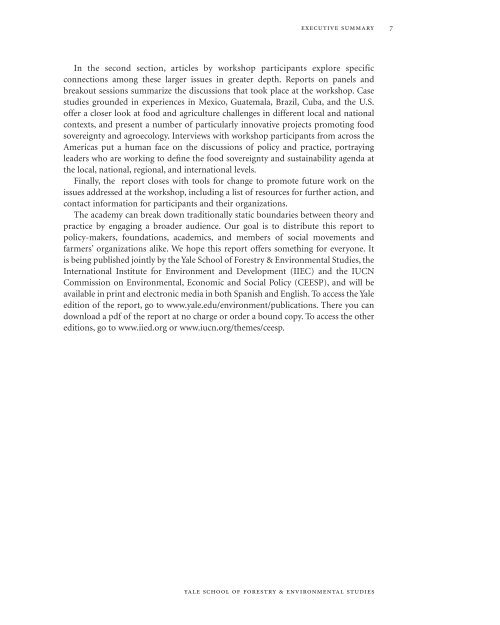Agroecology and the Struggle for Food Sovereignty ... - Yale University
Agroecology and the Struggle for Food Sovereignty ... - Yale University
Agroecology and the Struggle for Food Sovereignty ... - Yale University
You also want an ePaper? Increase the reach of your titles
YUMPU automatically turns print PDFs into web optimized ePapers that Google loves.
executive summary<br />
7<br />
In <strong>the</strong> second section, articles by workshop participants explore specific<br />
connections among <strong>the</strong>se larger issues in greater depth. Reports on panels <strong>and</strong><br />
breakout sessions summarize <strong>the</strong> discussions that took place at <strong>the</strong> workshop. Case<br />
studies grounded in experiences in Mexico, Guatemala, Brazil, Cuba, <strong>and</strong> <strong>the</strong> U.S.<br />
offer a closer look at food <strong>and</strong> agriculture challenges in different local <strong>and</strong> national<br />
contexts, <strong>and</strong> present a number of particularly innovative projects promoting food<br />
sovereignty <strong>and</strong> agroecology. Interviews with workshop participants from across <strong>the</strong><br />
Americas put a human face on <strong>the</strong> discussions of policy <strong>and</strong> practice, portraying<br />
leaders who are working to define <strong>the</strong> food sovereignty <strong>and</strong> sustainability agenda at<br />
<strong>the</strong> local, national, regional, <strong>and</strong> international levels.<br />
Finally, <strong>the</strong> report closes with tools <strong>for</strong> change to promote future work on <strong>the</strong><br />
issues addressed at <strong>the</strong> workshop, including a list of resources <strong>for</strong> fur<strong>the</strong>r action, <strong>and</strong><br />
contact in<strong>for</strong>mation <strong>for</strong> participants <strong>and</strong> <strong>the</strong>ir organizations.<br />
The academy can break down traditionally static boundaries between <strong>the</strong>ory <strong>and</strong><br />
practice by engaging a broader audience. Our goal is to distribute this report to<br />
policy-makers, foundations, academics, <strong>and</strong> members of social movements <strong>and</strong><br />
farmers’ organizations alike. We hope this report offers something <strong>for</strong> everyone. It<br />
is being published jointly by <strong>the</strong> <strong>Yale</strong> School of Forestry & Environmental Studies, <strong>the</strong><br />
International Institute <strong>for</strong> Environment <strong>and</strong> Development (IIEC) <strong>and</strong> <strong>the</strong> IUCN<br />
Commission on Environmental, Economic <strong>and</strong> Social Policy (CEESP), <strong>and</strong> will be<br />
available in print <strong>and</strong> electronic media in both Spanish <strong>and</strong> English. To access <strong>the</strong> <strong>Yale</strong><br />
edition of <strong>the</strong> report, go to www.yale.edu/environment/publications. There you can<br />
download a pdf of <strong>the</strong> report at no charge or order a bound copy. To access <strong>the</strong> o<strong>the</strong>r<br />
editions, go to www.iied.org or www.iucn.org/<strong>the</strong>mes/ceesp.<br />
yale school of <strong>for</strong>estry & environmental studies

















